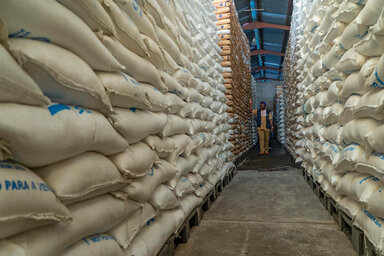
Independent evaluation
Areas of work
Strategic evaluations
Strategic evaluations assess global or corporate themes, programmes and initiatives that have been selected for their relevance to WFP’s strategic direction and management. OEV chooses topics based on: regular identification of risks and opportunities ahead of time, recurring findings from evaluations, relevance to strategic developments in WFP’s internal context and external environment, corporate innovations and ways of working, major knowledge gaps, and stakeholder suggestions and needs.
Policy evaluations
Policy evaluations assess quality, implementation and results. Evaluation of policies takes place between four and six years after the start of implementation and/or prior to policy changes.
Country strategic plan evaluations
Country strategic plan evaluations are the main instrument for accountability and learning regarding WFP’s interventions at country level. They encompass the entirety of WFP activities during a specific country strategic plan. They assess: WFP’s strategic positioning and role, the extent to which WFP has met the requirements of the country strategic plan, WFP’s contributions to strategic outcomes, efficiency, and factors that explain WFP performance.
Evaluations of corporate emergency responses
Evaluations of corporate emergency responses focus on the humanitarian context and principles, as well as the coverage, coherence and connectedness, of the emergency response. All system-wide responses to sudden and significant changes to a humanitarian situation (a Level 3 emergency) should trigger an inter-agency evaluation within the first year.
Impact evaluations
Impact evaluations assess the positive, negative, direct, indirect, intended and unintended changes in the lives of the people WFP serves. OEV may select topics for impact evaluations based on major knowledge gaps, stakeholder suggestions or other needs. This type of evaluation requires specific data availability and evaluation methods. Surveys, document reviews, focus group discussions, consultations with key players and participatory methods are often used.
Decentralized evaluations
Complementing OEV’s centralized and impact evaluations, decentralized evaluations cover activities, themes and transfer methods. They are managed by WFP country offices, regional bureaux and headquarters-based divisions other than the OEV. Decentralized evaluations are recommended before: the scale-up of pilots, innovations and prototypes, high-risk interventions, and the third repeat of an intervention.
Evaluation syntheses
Evaluation syntheses combine and analyse data from multiple evaluations to highlight cross-cutting issues and provide general conclusions.
Evidence summaries
Evidence summaries collate available evidence addressing a research question or a set of research questions related to a single topic. They are linked to ‘rapid review’ evaluation methodology and so are commonly produced within a short timeframe.





